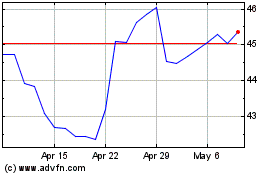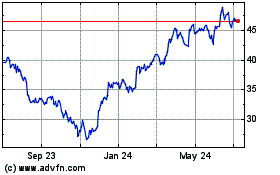Coming to a Dealer Near You: A 'Compliance Car' You May Actually Want
July 05 2017 - 3:21PM
Dow Jones News
By John D. Stoll
For decades, American car buyers have sifted through a catalog
of options when acquiring a new set of wheels. Paint colors,
connectivity gizmos, upholstery and wheel sizes commonly top that
list.
But a big change is coming under the hood, with federal and
state regulators requiring vehicle makers to get far cleaner by
2025. That means in coming years, shoppers for everything from
sporty Aston Martins to rugged Jeep Wranglers to capable Ford F-150
pickups will need to choose between the good old gasoline engine or
a propulsion system that incorporates battery technology.
On Wednesday, China-owned Volvo Car Corp. became the latest to
signal an aggressive shift to electrified and hybrid
electric-internal combustion vehicles. Toyota Motor Corp.,
Volkswagen AG and Daimler AG have also made bold commitments
recently, signaling they will move away from diesel or gasoline
internal combustion engines toward technologies that cut or
eliminate vehicle emissions.
U.S. car makers are making similar claims, pressured by
Obama-administration rules mandating a steep increase in
miles-per-gallon performance over the next eight years. Auto
executives say a broad shift toward electrification -- whether
"mild hybrids" that pair high-powered batteries with conventional
gasoline engines, or full-blown electric cars -- will be needed to
meet those demands.
Ford Motor Co, for instance, is spending $4.5 billion to revamp
its U.S. portfolio with hybrid pickup trucks and electric sport
utilities. Fiat Chrysler Automobiles NV's rugged Jeep lineup will
soon rely increasingly on battery power to tackle off-road
challenges.
The Trump administration is reviewing federal emissions rules,
but any rollback could take several years and may not address
mandates at the state level. California, and several states that
subscribe to the Golden State's clean-air rules, demand that 15% of
vehicle sales by 2025 be zero-emission cars.
Less than 1% of the record 17.5 million-plus vehicles sold in
the U.S. in 2016 put out zero emissions, according to
WardsAuto.com. But sales of partial-electric vehicles and EVs are
on the rise, according to the University of Michigan, as government
subsidies, model availability and refueling infrastructure
increase.
In Detroit, electrified vehicles have long been panned as
"compliance cars" because they help the makers comply with
clean-air rules -- even if they don't excite many customers or turn
a profit. These cars may be good for the environment, but bad for
the bottom line.
Often priced significantly higher than a conventional car,
vehicles like General Motors Co.'s Chevrolet Volt or Fiat's 500e
are niche vehicles that get a fraction of the marketing support or
consumer interest that profit-rich pickup trucks and SUVs achieve.
Fiat Chrysler Chief Executive Sergio Marchionne has even asked
buyers not to purchase the Fiat electric subcompact because the
company loses thousands of dollars on each sale.
To get electrification into the mainstream, analysts say several
factors need to fall into line. Gas prices, currently around $2 a
gallon, likely need to rise while government subsidies of at least
$7,500 per electric vehicle need to remain or increase, they
say.
In a report published earlier in this year, McKinsey & Co.
noted that "auto makers face a difficult challenge" when it comes
to how quickly to move away from internal combustion engines. The
consulting firm estimates 30% of U.S. buyers would consider an EV
purchase today, but car companies must boost consumer-education
initiatives and marketing campaigns at a time when overall demand
for automobiles is slipping.
"They must strike the right balance between selling enough EVs
to comply with tightening regulatory fleet emissions and fuel
economy targets, while also preventing the incremental cost of
adding battery packs from cannibalizing corporate profits,"
McKinsey said.
The consulting firm estimates battery-pack prices have fallen
about 80% since 2010, and an electric car and comparable
gasoline-powered car could hit cost parity within a decade.
Adding pressure on auto makers is Tesla Inc., a Silicon Valley
electric-car company that plans to start delivering its more
affordable Model 3 later this month. Tesla built a reputation
selling out of costly Model S sedans and Model X SUVs with price
tags routinely exceeding $100,000, but Chief Executive Elon Musk
says cars like the Model 3, starting at $35,000 but with similar
sex appeal, are needed if the electric-vehicle market is going to
grow.
Mainstream car companies are beginning to follow suit. Volvo has
been revived after pouring $11 billion into its product line since
being bought by China's Geely Holding Group in 2010, and now the
Swedish company plans to use its newfound appeal to push an
electric agenda.
Also on the list of coming electrified cars: Aston Martin
Lagonda Ltd.'s RapidE electric super car slated for 2019
production. Before then, Tata Motors' Jaguar division plans to
launch an electric SUV, Ford plans a hybrid version of its Mustang
sports car and BMW AG is expected to put on sale an all-electric 3
Series this fall after seeing lackluster demand for its small,
quirky i3 battery-powered cars.
Write to John D. Stoll at john.stoll@wsj.com
(END) Dow Jones Newswires
July 05, 2017 15:06 ET (19:06 GMT)
Copyright (c) 2017 Dow Jones & Company, Inc.
General Motors (NYSE:GM)
Historical Stock Chart
From Aug 2024 to Sep 2024

General Motors (NYSE:GM)
Historical Stock Chart
From Sep 2023 to Sep 2024
